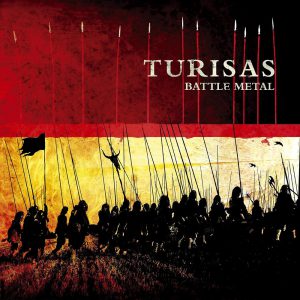Turisas Battle Metal Review
General Information:
Artist: Turisas
Album: Battle Metal
Genre(s): Folk Metal, Symphonic Metal
Subgenre(s): N/A
Released: 2004
Length: 57 minutes
Language(s): English, Finnish, Swedish
Label(s): Century Media Records
Track List:
01. Victoriae & Triumphi Dominus
02. As Torches Rise
03. Battle Metal
04. The Land of Hope and Glory
05. The Messenger
06. One More
07. Midnight Sunrise
08. Among Ancestors
09. Sahti-Waari
10. Prologue for R.R.R
11. Rex Regi Rebellis
12. Katuman Kaiku
Turisas Battle Metal Review
Battle Metal is the debut album of Finnish metal band Turisas. Stepping beyond the reach of the main subgenres of heavy metal, Turisas incorporate a choir, violin, recorders, an accordion, acoustic guitar and keyboard instruments into their sound; a unique blend of both the folk metal and symphonic metal fusion genres.
Turisas set a high bar when they introduce themselves to the world with the intro piece Victoriae & Triumphi Dominus. It is a proud procession composed of keyboards used to emulate trumpets, marching percussion and a dramatic choir arrangement. The former instrument is somewhat unexpected given the number of multi-instrumentalists and session musicians enlisted to bring this album to life but they are effective in their goal nonetheless.
While the lyrics for the intro piece have never been published in the album booklet or on the internet, they sound like some variation of the song title. The lyrics elsewhere focus on medieval battles, adventuring and the riches found afar, drinking and pagan themes. Between all of this and the image projected by the band in the booklet and elsewhere the question is with such an ambitious and all-encompassing vision on a debut album, do Turisas reach their lofty aspirations?
Living up to the Battle Metal title, both As Torches Rise and the title track throw the listener straight into the middle of the medieval fantasy realm. Lyrically this is done through the first person narrative in As Torches Rises. It details a failing battle with both moral and human losses (“I think of my family, I think of my home/Interrupted by a fearful tone:/”We’re practically dead, they’ll slaughter us all!”/Through a cloud of dust I see our right wing fall”). The last verse goes on to describe a bloody scene while contrasting it with descriptions of nature and the surroundings, a common theme found often in the band’s lyrics.
The narrative changes to third person for the title track (“They’ll crush your skull with a blow/And pile them in a row” and “As the battle rages the dearest to you, you hold in your hand – and stick in their lungs!”). This back and forth in perspectives can be found on other songs while, musically speaking, the listener is thrown into it the world of Turisas through the frequently bombastic arrangements, folky interludes and often gruff vocals that are sometimes accompanied by gang shouts. Guitars are almost always present and work in tandem with the instruments traditionally not found in heavy metal. They aren’t given the particular spotlight common to heavy metal so the bridges and interludes of the songs tend to be led by the non-metal side.
Prologue for R.R.R. is an inversion of everything else on Battle Metal. It is a third person monologue that uses textural keyboard effects to evoke a timeless space between present day and the past. Over the course of three minutes the speaker asks the listener to “remember those memories; grand and tearful which still, after hundreds of years, remain now radiant with the brightness of sunlight” in reference to their ancestors. This leads right into Rex Regi Rebellis and is performed in a mix of English, Finnish and Swedish. This is a bit pointless since the monologue before was performed entirely in English and breaks away from the strong narrative that Turisas was building if you don’t understand the three languages.
On the other hand Sahti-Waari is an effortlessly joyous drinking song in the folk metal vein. It is sung exclusively in Finnish and references the pagan narrative also found elsewhere in Battle Metal when they sing “No Christian sword will break us” in the second verse. It is one of the finest moments on Battle Metal and warrants multiple listens on its own.
Battle Metal ends with a second instrumental piece, Katuman Kaiku, with the first half being folk-orientated and the electric guitar coming in for the second half, if only to remind you that this is still a metal album, but it is a far cry from where Battle Metal began musically and thematically.
Midnight Sunrise and Among Ancestors are effectively one song linked together by an overly long recording of wind sounds that should really be on a separate track between these two songs. Along with The Land of Hope and Glory, that features an organ interlude that isn’t bad in its own right but is out of place, Turisas show some minor progressive rock leanings but they never becomes a significant component of the song-writing.
Turisas have wide-ranging scope for Battle Metal and what they want to present to the world. Some parts could have been fine-tuned but it is fair to say that their aspirations have been achieved here and that the band landed on both feet with their debut.
Performers:
Mathias Nygard: Vocals, recorders (alto, soprano and sopranino), programming, additional percussions
Jussi Wickstrom: Acoustic, bass and electric guitars, double bass
Tude Lehtonen: Drums, bongos, congas, djembe, udu and electric percussion
Antti Ventola: Hammond organ, Piano, synthesizers, vibraphone
Georg Laakso: Acoustic and electric guitars
Additional Performers:
Riku Ylitalo: Accordion
Olli Vanska: Violin
Emmanuelle Zoldan: Vocals
External Links:
Turisas Homepage
Turisas on Wikipedia
Battle Metal on Wikipedia
